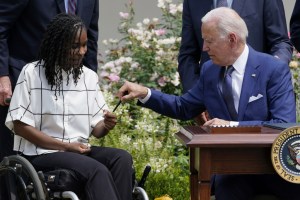
Leaders celebrated 31 years of the passing of the American with Disabilities Act and President Joe Biden proposed amendments and considerations for those with long-term effects from COVID-19. (Courtesy Photo)
By Sharece Crawford
Special to the AFRO
Disability impacts all of us. According to the Centers for Disease Control and Prevention (CDC) 61 Million Adults in the United States live with disabilities. Twenty six percent of the United States population, or one in every four adults, have some type of disability. Even with such a large percentage of Americans affected by disabilities, health care access barriers exist for many working-age adults. One in three adults with disabilities 18 to 44 years of age do not have a usual health care provider; one in three adults with disabilities 18 to 44 years of age have an unmet health care need because of cost. Because of these alarming numbers and the surging of the COVID-19 Delta variant the CDC encourages everyone to join forces to improve the health of people living with disabilities.
The AFRO joined the District’s Representative to Congress Eleanor Holmes Norton (D), Senator Tammy Duckwith (D-Illinois ) as well as other officials and disabled activists at the Franklin Delano Roosevelt Memorial in Washington, D.C., for a wreath-laying event for the 31st anniversary of the Americans with Disability Act (ADA) to honor disability activism and reflect on the progress and unfinished business of disability rights.
“Even after 31 years, attacks on the law continue, including in the last Congress, where a bill that would have weakened already limited enforcement, passed the House. Business associations are still fighting the ADA as well,” said Sen. Duckworth.
“They have misconceptions about the ADA lawsuits, what they mean and where they come from,” Duckworth continued.
Norton said she believes that disability protections are “human rights.”
In Washington, D.C Disability Advocates are organizing to form a disability caucus.
President Joe Biden also celebrated the 31st anniversary of the Americans with Disabilities Act and announced new guidance surrounding the pandemic, suggesting long-term COVID-19 could be considered a disability in some cases under federal civil rights laws. The President announced, “Resources to Support Individuals with Long COVID.” Through quick policy action, the Administration has ensured disabled Americans are receiving resources and are included in key administrative proposals.
In addition, a COVID-19 vaccine exemption based on medical reasons is covered under the Americans with Disabilities Act, requiring reasonable accommodations.
The law covers any impairment that has a “substantially limiting effect” on the employee’s ability to be considered for or have access to terms or conditions of employment..
While employers can ask job candidates if they are vaccinated against COVID-19, they cannot ask why a candidate is not vaccinated until they are an employee.
For the medical exemption, an employee must “put the employer on notice,” of any existing medical condition preventing them from getting the vaccine and provide medical documentation that establishes a “reasonable likelihood” that performing the job would make their condition worse.
To reasonably accommodate the medical exemption, the employee and employer must enter an “interactive process,” in which both are involved in coming up with possible accommodations. Employers are able to request additional information from the employee’s doctor or request the employee to get examined.
For both exemptions, employers do not have to choose the accommodation that the employee wants. The accommodation needs only follow an interactive process, work for the employee and be effective in its purpose.
Help us Continue to tell OUR Story and join the AFRO family as a member – subscribers are now members! Join here!
The post What you should know about COVID-19, disabilities appeared first on AFRO American Newspapers .










